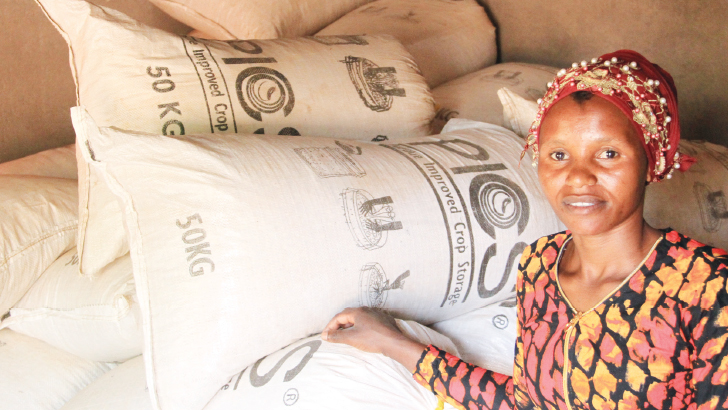Laika Jackson, 34, is a farmer to emulate in Chawina Village near Namwera, almost 30 kilometres east of Mangochi Town.
She harvests more and jealously protects her yield from pests and poor handling.
She finds it painful that poor farmers, who toil in rain and scorching sunshine, lose almost three in every 10 bags because they did not handle it properly.
“I no longer share my hard-earned harvest with weevils, termites and molds,” she states. “Previously, my children and I used to starve from October to March partly because of post-harvest grain losses.”
Laika has raised three children singlehandedly since 2018.
“It’s never easy, but it’s easier because I take farming as a business. I refuse to feed pests while people lack food,” she asserts.
She owns stacks of maize packed in air-tight, double-layered bags that smother weevils and keep the grain intact for over a year without using pesticides.
Last growing season, she harvested 60 bags of maize and 30 of soya beans.
“Before I embraced these Pics bags, about 60 bags would have rotten or fed pests if I didn’t use pesticides. Now I don’t need chemicals.”
She dried her grain meticulously before filling the bags to keep it safe for sale and home use.
She explains: “I’m keeping it for the lean season which coincides with the rainy months. When most households run out of food, I will sell 30 bags and retain the rest for my family and pieceworkers who help me in the fields.
“For me, Pics bags make business sense. To fetch good prices when the demand rises, I have to keep it well.”
From her farming business, Laika has bought five goats, mattresses, an oxcart and a motorcycle. She bought a pushbike for her daughter who once endured long walks to school. The walks keep pushing young girls to dropout and marry.
“Since we don’t lose anything, we have more to sell. This makes our lives better,” she states.
Last year, Laika bought land and built a three-bedroom house after selling 33 bags at K250 000.
“This year, I will plaster the walls. I can afford cement because maize prices almost double when hunger kicks in,” she hints.
Laika embraced Pics sacks in 2018, when Nasfam shared two with every lead farmer in her area as part of a climate-smart agriculture project funded by Irish Aid.
“After six months, I discovered there was no weevil eating the grain. Then I bought 10 more bags. Now I have 70 Pics bags for maize and 30 for soya,” she narrates.
Tarcizio Chimbwanya, National Smallholder Farmers’ Association of Malawi (Nasfam) business manager at Namwera Smallholder Farmers Association, is happy that “Laika no longer buys pesticides twice or thrice a year”.
The farmer was one of the early adopters and ambassadors of the modern bags.
“The chemicals are costly, but farmers were losing because the weevils were attacking their grain after just six weeks,” he explains.
Laika had to apply the pesticides repeatedly to save the remainder, she says.
The model farmer reckons the flour from the pesticide-treated maize was bitter and smelly.
“Children were frequently opening bowels and complaining of stomach aches,” she recalls.
She recalled a disastrous dinner in 2015 when her food basket run dry and she hastily took treated maize to a grinding mill.
“My daughter purged and I had to rush her to Namwera Mission Hospital. This is how preventable conditions steal time best spent on caring for our families, crops and businesses,” she explains.
When a child falls sick, Laika spends at least K1 000 on medical trips and bills.
“This, plus rising prices of pesticides, was a big burden on my purse,” says the woman who also sells zitenje (wrappers) in her neighbourhood.
The business earns her no less than K50 000 monthly.
In May, she sold pest-free soya at K500 per kilogramme via the Namwera Smallholder Farmers’ Association under Nasfam. Laika is a member of the association.
“With Pics bags, I spend less on storage and my harvest fetches more because it is pest-free,” she says. “I use the savings and earnings to pay tuition and buy basics for my schoolchildren.”
She pays K12 500 a term for her daughter at Majuni Secondary School.
Eni Issa acquired 18 Pics bags. Last year, she harvested 24 bags from her one-acre maize field in Dzimbiri Village.
“Since an extension officer from Nasfam shared the advantages of Pics bags, I have stuck by these sacks because I know the pain of losing a harvest with rats and weevils,” she brags.
The post Pics bags mean business appeared first on The Nation Online.
 Moni Malawi
Moni Malawi 

